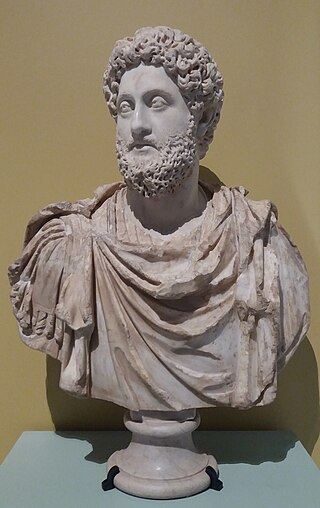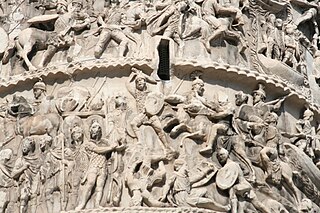
Marcus Aurelius Antoninus was Roman emperor from 161 to 180 AD and a Stoic philosopher. He was the last of the rulers known, noncontemporaneously, as the Five Good Emperors and the last emperor of the Pax Romana, an age of relative peace, calmness, and stability for the Roman Empire lasting from 27 BC to 180 AD. He served as Roman consul in 140, 145, and 161.
The 170s decade ran from January 1, 170, to December 31, 179.

Commodus was a Roman emperor who ruled from 177 to 192. He served jointly with his father Marcus Aurelius from 177 until the latter's death in 180, and thereafter he reigned alone until his assassination. His reign is commonly thought as marking the end of a golden age of peace and prosperity in the history of the Roman Empire.

The Quadi were a Germanic people who lived approximately in the area of modern Moravia in the time of the Roman Empire. The only surviving contemporary reports about the Germanic tribe are those of the Romans, whose empire had its border on the River Danube just to the south of the Quadi. They associated the Quadi with their neighbours the Marcomanni, and described both groups as having entered the region after the Celtic Boii had left it deserted. The Quadi may later have contributed to the "Suebian" group who crossed the Rhine with the Vandals and Alans in the 406 Crossing of the Rhine, and later founded a kingdom in northwestern Iberia.

The Iazyges were an ancient Sarmatian tribe that traveled westward in c. 200 BC from Central Asia to the steppes of modern Ukraine. In c. 44 BC, they moved into modern-day Hungary and Serbia near the Dacian steppe between the Danube and Tisza rivers, where they adopted a semi-sedentary lifestyle.

Publius Helvius Pertinax was Roman emperor for the first three months of 193. He succeeded Commodus to become the first emperor during the tumultuous Year of the Five Emperors.

Marcus Didius Julianus was Roman emperor from March to June 193, during the Year of the Five Emperors. Julianus had a promising political career, governing several provinces, including Dalmatia and Germania Inferior, and defeated the Chauci and Chatti, two invading Germanic tribes. He was even appointed to the consulship in 175 along with Pertinax as a reward, before being demoted by Commodus. After this demotion, his early, promising political career languished.

Annia Galeria Faustina the Younger was Roman empress from 161 to her death as the wife of Emperor Marcus Aurelius, her maternal cousin. Faustina was the youngest child of Emperor Antoninus Pius and Empress Faustina the Elder. She was held in high esteem by soldiers and her husband as Augusta and Mater Castrorum and was given divine honours after her death.
Gaius Avidius Cassius was a Syrian Roman general and usurper. He was born in Cyrrhus, and was the son of Gaius Avidius Heliodorus, who served as praefectus or governor of Roman Egypt, and Julia Cassia Alexandra, who was related to a number of royal figures, including her descent from both Augustus and Herod the Great. He began his military career under Antoninus Pius, rising to the status of legatus legionis. He served during the Parthian war of Lucius Verus, in which he distinguished himself, for which he was elevated to the Senate, and later made Imperial legate. During the Bucolic War, he was given the extraordinary title of Rector Orientis, giving him Imperium over all of the eastern provinces of the Roman Empire.

The Marcomannic Wars were a series of wars lasting from about 166 until 180 AD. These wars pitted the Roman Empire against, principally, the Germanic Marcomanni and Quadi and the Sarmatian Iazyges; there were related conflicts with several other Germanic, Sarmatian and Gothic peoples along both sides of the whole length of the Roman Empire's northeastern European border, the river Danube.
Dapyx was a 1st-century BC chieftain of a Getae tribe or a tribe union in Scythia Minor. Cassius Dio talks about him in the campaigns of Marcus Licinius Crassus on the Lower Danube region, being said to be a king on the region of central Scythia Minor who went to war with Rholes, a Roman ally. Crassus came to Roles' assistance and comprehensively defeated Dapyx's army, with their leader taking refuge in a fort, being betrayed and killed.

The Dentheletae, also Danthaletae (Δανθαλῆται) or Denseletae, were a Thracian tribe that in antiquity lived near the sources of the River Strymon, and are mentioned in texts by Polybius, Cassius Dio, Tacitus and by Livy. They lived in the neighbourhoods of the modern towns Kyustendil and Dupnitsa, stretching to as far as the mountains to the west towards the valleys of the Morava and the Vardar river, with territories situated next to the Thracian tribes Agrianes and the Maedi. Their main city, called Dentheletica, was presumably Pautalia as this was the capital of the Roman region Dentheletica. They possibly built fortifications around Stara Planina in the 1st century BC, lived around Sofia and Skaptopara was their town.
Rholes or Roles was a Getae chieftain in Scythia Minor mentioned by Cassius Dio in his Roman History. According to Dio, he helped Roman general Marcus Licinius Crassus defeat the Bastarnae, and when he visited Octavian, he was treated as "a friend and ally" for his support for the Romans. Later he sent for Crassus to help in his conflict with Getae chieftain Dapyx. These events have been dated to 31-27 BC.

The reign of Marcus Aurelius began with his accession on 7 March 161 following the death of his adoptive father, Antoninus Pius, and ended with his own death on 17 March 180. Marcus first ruled jointly with his adoptive brother, Lucius Verus. They shared the throne until Lucius' death in 169. Marcus was succeeded by his son Commodus, who had been made co-emperor in 177.

Slovakia was partly occupied by Roman legions for a short period of time. Marcomannia was a proposed province of the Roman Empire that Emperor Marcus Aurelius planned to establish in this territory. It was inhabited by the Germanic tribes of Marcomanni and Quadi, and lay in the western parts of the modern states and Slovakia and the Czech Republic (Moravia). Part of the area was occupied by the Romans under Marcus Aurelius between 174 AD and 180 AD. His successors abandoned the project, but the people of the area became steadily Romanized during the next two centuries. The Roman influence was disrupted with the invasions of Attila starting around 434 AD and as Slavic people later began to move into the area.
Ballomar or Ballomarios was a leader of the Marcomanni during the Marcomannic Wars.
Battarius was a barbarian child ruler in the Marcomannic War. He is mentioned in the Historia romana of Cassius Dio. Accordingly, Battarius went before Marcus Aurelius, and requested an alliance. The emperor granted his request. In return for gold, Battiarus managed to succeed in restraining Tarbus, a neighbouring chieftain, who had come into Dacia threatening to make war unless Rome paid him gold.
Furtius was a ruler of the Quadi, a Germanic tribe, during the Marcomannic War.
Publius Tarrutenius Paternus was a Roman eques who flourished during the reign of emperor Marcus Aurelius. He achieved several military successes, leading first to his appointment as praetorian prefect and subsequently to his adlection into the Roman Senate. Paternus was accused of treason by Aurelius' son and successor Commodus, and executed.
Marcus Aurelius Papirius Dionysius was a Roman eques and jurist who held a number of military and civilian positions during the reign of the Emperors Marcus Aurelius and his son Commodus, including praefectus annonae, or overseer of the grain rations for Rome.










